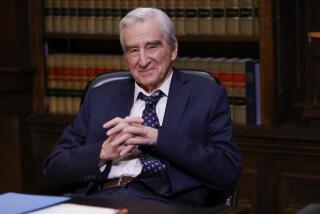Critic’s Notebook: For Jared Harris on his leaving ‘Mad Men’
- Share via
On AMC’s “Mad Men” Sunday night, Jared Harris made his second exit from a television series this season. The first, a few weeks back, was from Fox’s “Fringe,”where his David Robert Jones -- suddenly revealed to be not the brainy mastermind behind the show’s collapsing universes but only a pawn (or a bishop, according to the script) in William Bell’s (Leonard Nimoy) twisted game -- literally crumbled to dust on a Boston rooftop.
His departure from “Mad Men” was not exactly a surprise, given his character’s season-long struggle to get out from under a financial misjudgment and ethical blooper; certainly, from the time Don Draper required Lane Pryce’s resignation for forging his signature on a check, his fate was all but a fait accompli. And yet it came as a shock: I felt until the end that things might still work out differently, because I hoped they would.
I’ve loved Harris’ work since I saw him in Mary Harron’s 1996 film “I Shot Andy Warhol,” in which he played an unusually convincing version of the pale-faced, silver-wigged pop artist, one in which you saw the worker and not merely, as is most often the case in Warhol impersonations, the freak. There, as elsewhere, he found the person in the part: No matter how few notes or brief a tune he’s given to play -- his appearances on “Fringe” amounted nine over five years, but he seemed a cornerstone of the series -- Harris works them, with subtle grace notes and ornaments, into something memorable, complex and true.
A player of great range -- other real people he has played include Henry VIII and John Lennon, with Ulysses S. Grant coming soon (in Steven Spielberg’s “Lincoln”) -- who never seems less than himself, his default is an elegant classical intelligence, from which solid center he can go louder or softer, rougher or smoother, more contained or expansive as the role demands. A lilting voice with a fine sawtooth edge handed down from his father, the late Richard Harris (Dumbledore No. 1), is his primary instrument. But Harris is also that valuable thing, an attractive character actor -- not pretty in the way of modern leading men, but more handsome than he lets himself seem and able (like Bill Nighy before him, and George Sanders before them both) to call on the authority of his looks.
Indeed, both Jones and Lane were dashing in their way, folding their very different complications into a carapace of British politesse and understatement. Yet each also created tension: Jones, because you knew bad things were going to happen to characters you cared about whenever he arrived; Lane, because you cared for him and feared for his tenuous happiness. Introduced as an irritant, the bean-counting representative of an occupying foreign power, he became the hero that liberated them and grew into one of the warmer and more sympathetic characters on “Mad Men,” one who wanted a better and not merely a more successful life. I rooted for him until the moment his body was discovered in his office, hanged.
So farewell, Lane; goodbye, Jones. I will miss you both. Happily, your actor will go on.
Related:
‘Mad Men’ Q&A;: Jared Harris on Lane’s tragic episode
‘Mad Men’ recap: A moment before you need more happiness
Critic’s Notebook: ‘Mad Men’ and long-lost Beatles cartoons
More to Read
The complete guide to home viewing
Get Screen Gab for everything about the TV shows and streaming movies everyone’s talking about.
You may occasionally receive promotional content from the Los Angeles Times.







